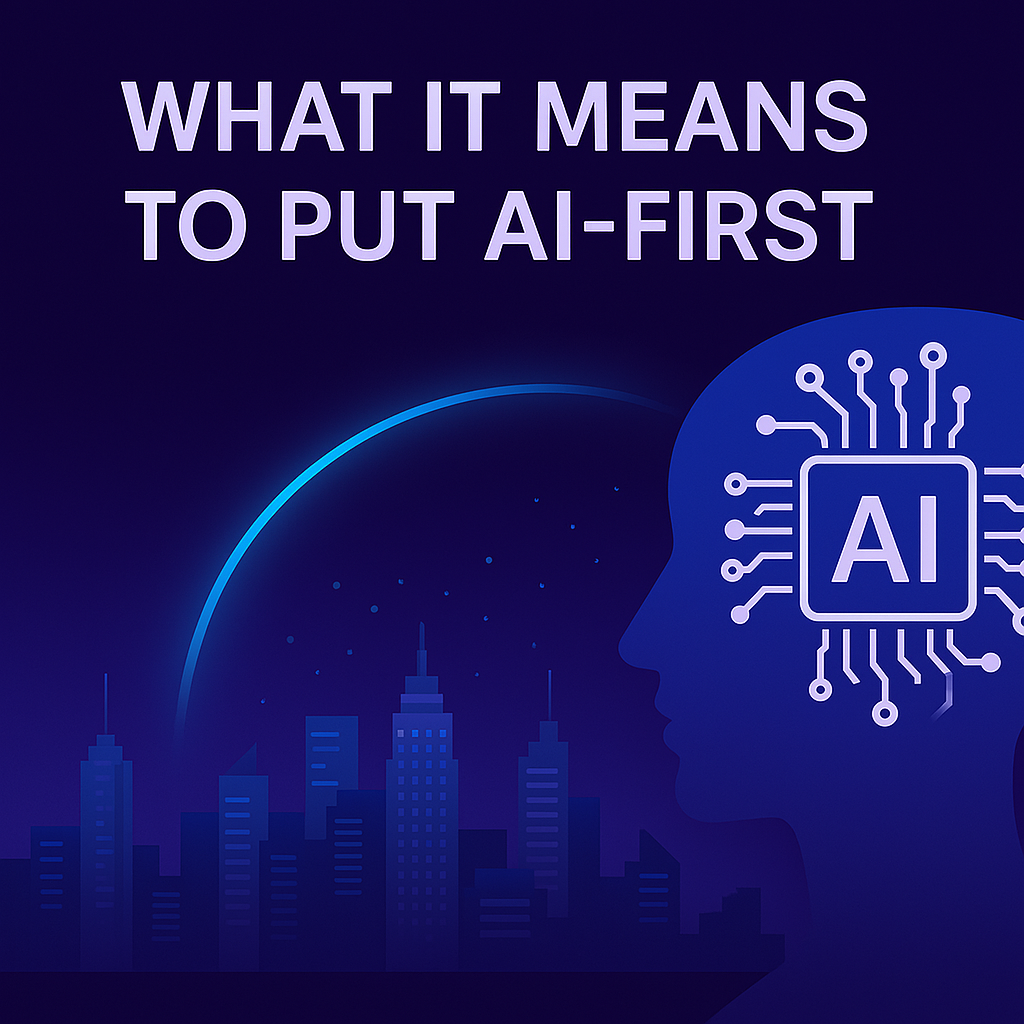Understanding the AI-first Mindset
What does an AI-first mindset entail?
An AI-first mindset involves prioritizing artificial intelligence in strategic decisions and embedding it into the core of business processes. This approach views AI not just as a tool but as a foundational element in driving business transformation and innovation.
How can organizations develop an AI-first mindset?
Developing an AI-first mindset requires organizations to align their business objectives with AI capabilities. This involves training teams, investing in AI technologies, and fostering a culture that embraces digital transformation as a key to future success.
Why is an AI-first approach essential in the modern era?
In an increasingly AI-driven world, adopting an AI-first approach ensures that companies stay competitive and relevant. This strategy leverages AI to solve complex problems, optimize operations, and innovate products and services, providing a significant edge in the market.
How to use AI Effectively in Your Business
What are the best practices for AI adoption?
Best practices to adopt AI includes starting with clear strategic goals, ensuring cross-functional collaboration, and maintaining strong ethical considerations. Businesses should focus on building AI systems that are scalable, secure, and integrated seamlessly with existing workflows.
How can businesses leverage AI for competitive advantage?
Businesses can use AI first mindset to analyze user behavior, automate routine tasks, and personalize customer interactions. By turning these insights into actionable strategies, companies can compete and win in their respective industries.
What role do AI technologies play in business strategy?
AI technologies are vital for data-driven decision-making and improving operational efficiencies. They play a critical role in refining business processes, enhancing customer service, and driving innovation, making them indispensable in modern business strategies.
What Does AI-First Mean for Companies?
How are AI-first companies reshaping their industries?
AI-first companies are at the forefront of transforming their industries by deploying advanced technologies like machine learning models and large language models (LLMs) to enhance productivity and customer satisfaction.
What competitive advantages do AI-first strategies provide?
An AI-first strategy provides a differentiator in the marketplace. It makes it possible for businesses operate more effectively, react to market shifts faster, and provide innovative products and services that satisfy evolving customer needs.
How can startups adopt an AI-first approach?
Startups can adopt an AI-first approach by integrating AI from the ground up. This entails utilizing AI-native tools and technologies, which can simplify development and accelerate go-to-market strategies, increasing their responsiveness and agility.
AI’s Role in the AI Era
How is AI changing the landscape of business?
By enabling faster more accurate decision-making and creating innovative methods for businesses to interact with clients, AI is revolutionizing a number of industries. It’s turning into a vital instrument for navigating the complexities of modern markets.
What does the AI-first world look like?
In an AI-first world, organizations use AI to enhance every aspect of business, from operations to customer service. AI-driven companies are more adaptable, more efficient, and often more successful in capturing and retaining customers.
How will AI and machine learning evolve in the future?
AI’s capabilities and machine learning are expected to continue evolving, becoming more sophisticated and integrated into everyday business activities. Future advancements will likely focus on increasing the autonomy of AI systems and improving their ability to interact in more human-like ways.
Building AI Systems for Automation
What are the key components to build AI systems?
The key components for building AI systems include robust data infrastructure, advanced analytics capabilities, and strong domain expertise. When combined, these elements enable businesses the ability to build strong AI solutions that can automate complex processes and provide significant business value.
How can companies automate processes using AI?
Companies can automate processes using AI by implementing technologies that handle data-heavy tasks, such as customer service chatbots or automated supply chain management solutions. These tools help free up human resources for more strategic tasks.
What is the significance of data science in AI development?
Data science is crucial in AI development as it provides the methodologies and knowledge base for training AI models. It helps in understanding patterns, making predictions, and making data-driven decisions that are essential for AI effectiveness.
Optimizing Customer Experience with AI
How can businesses integrate AI into customer experience?
Integrating AI into customer experience involves using AI tools to personalize interactions, predict customer needs, and provide timely solutions. This can significantly enhance user experience and satisfaction.
What are some examples of AI-driven customer service?
Examples include AI chatbots that offer 24/7 customer support and recommendation systems in e-commerce that suggest products based on customer preferences and previous purchases.
How does AI design impact user interactions?
AI design impacts user interactions by improving usability and ensuring that the interactions are more engaging and responsive. This not only improves the customer’s experience but also builds trust and loyalty towards the brand.
In conclusion, adopting an AI-first strategy is essential for businesses aiming to lead in innovation and efficiency. This approach goes beyond using AI as a tool; it integrates artificial intelligence at the core of business operations, enabling companies to compete effectively and set new industry standards. As emphasized by startup investor Ash Fontana, an AI-first mindset acts as a critical differentiator, driving continuous improvement and customer-centric innovations. Businesses that embed AI into their strategic planning and everyday operations are poised to lead in the evolving, technology-driven marketplace.
